Anthony McIntyre's Blog, page 1185
September 29, 2017
Crossing the Line
Christopher Owens reviews the latest work from the pen of Martin Dillon. Influenced by post punk and industrial music, Christopher Owens reviews for Metal Ireland and finds time to study the history and inherent contradictions of Ireland.
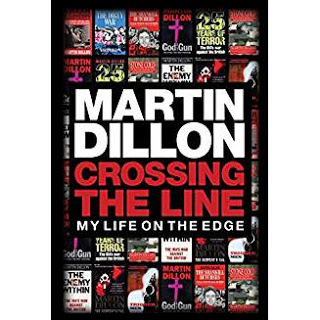
The terms 'memoir' and 'autobiography' are often used interchangeably. So much so that they can potentially mis-sell the book to a reader. How many times have you been disappointed by certain "autobiographies" because they haven't focused on a particular era of a person's life?
Regardless of terms, these books are always in high demand and for obvious reasons: we as readers are curious beings. Be it Katie Price, Keith Richards or Ken Maginnis, we want to know what was going through someone's mind during a particular incident in their life.
In many ways, it also panders to human egotism and the scourge of celebrity cult that we have found ourselves in for a number of years. We give these individuals an elevated platform because, in the words of Father Ted, "...what's great about being famous? People listen to you. They listen to what you say, and I have a lot to say."
Martin Dillon is possibly the most widely read author on the Troubles. However, he has taken a critical pasting over the last twenty years as new facts emerge about cases he's openly speculated on, although there's no denying that Dillon has done an awful lot to shed some light on the likes of secret burials, murderous British Army units and infiltrated loyalist paramilitary organisations.
Since the Good Friday Agreement, he's cut a forlorn figure. His last book before this, 2003's The Trigger Men, was effectively a compendium of his previous books but with new additions like Johnny Adair and Dominic McGlinchey. After that, nothing. He appeared to be in retirement in New York, writing plays and poetry and occasionally being wheeled out on Stephen Nolan's human bear baiting radio show to talk about the events of August 1969.
He's re-entered the arena slowly, by contributing a foreword to Aaron Edwards' disappointing book on the UVF, and praising Malachi O'Doherty's insipid biography of Gerry Adams. And now this.
First off, the title doesn't inspire much confidence (making the book seem like a third rate potboiler), nor does the cover (a compilation of his most famous books). It smacks of cheapness, laziness and a smug, self serving attitude.
Overall, it's safe to say that the book is a mixed bag. The early years are involving and the descriptions laced with humour and affection for his relatives and teachers, although the combination of abusive priests, closeted high society artists and lobotomised IRA uncles does threaten to turn it into a parody of a Patrick McCabe novel.
What these chapters do is reinforce the fact that the North (pre conflict) was a divided place certainly, but also one where both communities worked and shopped in areas that would eventually be polarised. It was certainly a different time and, when you consider comments by the likes of John Hume who felt that the emerging Catholic middle class saw the North as their country as much as Unionists and were ready to protest for equality, it's hard not to envisage a fantasy scenario where Protestants saw themselves as equally oppressed as their Catholic counterparts, united and began a process which would led to an equal state for both communities.
Of course, that's wish fulfilment thinking (especially considering the political setup of this country) but it does make you think. Imagine what could have been achieved if both sides had realised they suffered from injustice and inequality. Tales of the pre Troubles North are one of the many tragic facets of Irish history.
When the story graduates to our intrepid journalist taking up a job in the BBC, we move into two of the biggest problems with autobiographies/memoirs: tedious point scoring and name dropping. Thankfully, there's no "needless to say, I had the last laugh" moments (a la Alan Partridge), but he comes close at times, especially discussing the issues surrounding the creation and first year of Talkback for BBC Radio Ulster.
The publicity surrounding Dillon's claim that BBC NI were happy to follow government thinking overlooks the fact that he's discussed this before in quite a few of his books. If true, his tale of the BBC kowtowing to the Ulster Worker's Council strike is a chilling indictment of managerial incompetence. Other tales provoke yawning: I must confess I had never heard of his "satirical" TV programme 'The Show' and his depiction of it makes it seem so self consciously "wacky" (like a third rate student amateur drama society attempting to do Monty Python), that I never want to see it.
In terms of his claims that he's made about various people/incidents in his writing over the years, he still sticks to his assertion that Lenny Murphy was an undiagnosed psychopath, despite Steve Bruce (in the eyes of some) demolishing that theory in his book The Red Hand.
He claims that Brendan Hughes was one of his regular sources (and that it was him who provided Dillon with a copy of the IRA Green Book which was published in 1990's The Dirty War. This, of course, is perfectly feasible. However, he also claims that Hughes had attempted (unsuccessfully) to gain access to documents related to the murder of Joe Fenton for Dillon.
This would suggest that Hughes was the senior member of the IRA in The Dirty War who claimed that Fenton was providing the IRA with information on informers, naming people like Gerard and Catherine Mahon. If that was the case, why doesn't Dillon elaborate on this in Crossing the Line, using it as an example of how compromised the IRA were by the end of the 80's?
More intriguingly, he devotes a chapter to the case of Brendan Davison (referred to as 'Davidson' in the book) and regurgitates the claim that he was an informer. This time, he adds allegations that he was also a paedophile and speculates that this is what made him vulnerable to blackmail.
Curiously, it seems he's gleamed this information from an Irish Independent article by Jim Cusack (who also misspells Davison's surname). Surely, if Davison was the compromised 'loose cannon' openly antagonistic to the Adams leadership as depicted in this book, Dillon would have written about this in The Dirty War instead of devoting two pages to him and passing him off as a mere police informer?
While it's possible that he could probably explain some of these inconsistencies by claiming new information has become available over the years, it would be nice if he'd tied them up in this book by using phrases like "in this book, I wrote this but I was unaware of...", which comes across as less dishonest.
Finally, he seems to really, really think highly of his creative writing as he liberally quotes from it throughout the book. Which goes back to what I said about the cover: self serving and smug.
Give it a go. Enjoy the early chapters. And take the rest with a huge pinch of salt.
Martin Dillon, 2017, Crossing the Line: My Life on the Edge. Merrion Press. ISBN-13: 978-1785371301



The terms 'memoir' and 'autobiography' are often used interchangeably. So much so that they can potentially mis-sell the book to a reader. How many times have you been disappointed by certain "autobiographies" because they haven't focused on a particular era of a person's life?
Regardless of terms, these books are always in high demand and for obvious reasons: we as readers are curious beings. Be it Katie Price, Keith Richards or Ken Maginnis, we want to know what was going through someone's mind during a particular incident in their life.
In many ways, it also panders to human egotism and the scourge of celebrity cult that we have found ourselves in for a number of years. We give these individuals an elevated platform because, in the words of Father Ted, "...what's great about being famous? People listen to you. They listen to what you say, and I have a lot to say."
Martin Dillon is possibly the most widely read author on the Troubles. However, he has taken a critical pasting over the last twenty years as new facts emerge about cases he's openly speculated on, although there's no denying that Dillon has done an awful lot to shed some light on the likes of secret burials, murderous British Army units and infiltrated loyalist paramilitary organisations.
Since the Good Friday Agreement, he's cut a forlorn figure. His last book before this, 2003's The Trigger Men, was effectively a compendium of his previous books but with new additions like Johnny Adair and Dominic McGlinchey. After that, nothing. He appeared to be in retirement in New York, writing plays and poetry and occasionally being wheeled out on Stephen Nolan's human bear baiting radio show to talk about the events of August 1969.
He's re-entered the arena slowly, by contributing a foreword to Aaron Edwards' disappointing book on the UVF, and praising Malachi O'Doherty's insipid biography of Gerry Adams. And now this.
First off, the title doesn't inspire much confidence (making the book seem like a third rate potboiler), nor does the cover (a compilation of his most famous books). It smacks of cheapness, laziness and a smug, self serving attitude.
Overall, it's safe to say that the book is a mixed bag. The early years are involving and the descriptions laced with humour and affection for his relatives and teachers, although the combination of abusive priests, closeted high society artists and lobotomised IRA uncles does threaten to turn it into a parody of a Patrick McCabe novel.
What these chapters do is reinforce the fact that the North (pre conflict) was a divided place certainly, but also one where both communities worked and shopped in areas that would eventually be polarised. It was certainly a different time and, when you consider comments by the likes of John Hume who felt that the emerging Catholic middle class saw the North as their country as much as Unionists and were ready to protest for equality, it's hard not to envisage a fantasy scenario where Protestants saw themselves as equally oppressed as their Catholic counterparts, united and began a process which would led to an equal state for both communities.
Of course, that's wish fulfilment thinking (especially considering the political setup of this country) but it does make you think. Imagine what could have been achieved if both sides had realised they suffered from injustice and inequality. Tales of the pre Troubles North are one of the many tragic facets of Irish history.
When the story graduates to our intrepid journalist taking up a job in the BBC, we move into two of the biggest problems with autobiographies/memoirs: tedious point scoring and name dropping. Thankfully, there's no "needless to say, I had the last laugh" moments (a la Alan Partridge), but he comes close at times, especially discussing the issues surrounding the creation and first year of Talkback for BBC Radio Ulster.
The publicity surrounding Dillon's claim that BBC NI were happy to follow government thinking overlooks the fact that he's discussed this before in quite a few of his books. If true, his tale of the BBC kowtowing to the Ulster Worker's Council strike is a chilling indictment of managerial incompetence. Other tales provoke yawning: I must confess I had never heard of his "satirical" TV programme 'The Show' and his depiction of it makes it seem so self consciously "wacky" (like a third rate student amateur drama society attempting to do Monty Python), that I never want to see it.
In terms of his claims that he's made about various people/incidents in his writing over the years, he still sticks to his assertion that Lenny Murphy was an undiagnosed psychopath, despite Steve Bruce (in the eyes of some) demolishing that theory in his book The Red Hand.
He claims that Brendan Hughes was one of his regular sources (and that it was him who provided Dillon with a copy of the IRA Green Book which was published in 1990's The Dirty War. This, of course, is perfectly feasible. However, he also claims that Hughes had attempted (unsuccessfully) to gain access to documents related to the murder of Joe Fenton for Dillon.
This would suggest that Hughes was the senior member of the IRA in The Dirty War who claimed that Fenton was providing the IRA with information on informers, naming people like Gerard and Catherine Mahon. If that was the case, why doesn't Dillon elaborate on this in Crossing the Line, using it as an example of how compromised the IRA were by the end of the 80's?
More intriguingly, he devotes a chapter to the case of Brendan Davison (referred to as 'Davidson' in the book) and regurgitates the claim that he was an informer. This time, he adds allegations that he was also a paedophile and speculates that this is what made him vulnerable to blackmail.
Curiously, it seems he's gleamed this information from an Irish Independent article by Jim Cusack (who also misspells Davison's surname). Surely, if Davison was the compromised 'loose cannon' openly antagonistic to the Adams leadership as depicted in this book, Dillon would have written about this in The Dirty War instead of devoting two pages to him and passing him off as a mere police informer?
While it's possible that he could probably explain some of these inconsistencies by claiming new information has become available over the years, it would be nice if he'd tied them up in this book by using phrases like "in this book, I wrote this but I was unaware of...", which comes across as less dishonest.
Finally, he seems to really, really think highly of his creative writing as he liberally quotes from it throughout the book. Which goes back to what I said about the cover: self serving and smug.
Give it a go. Enjoy the early chapters. And take the rest with a huge pinch of salt.
Martin Dillon, 2017, Crossing the Line: My Life on the Edge. Merrion Press. ISBN-13: 978-1785371301


Published on September 29, 2017 00:00
September 28, 2017
Countering Glaring Factual Inaccuracies
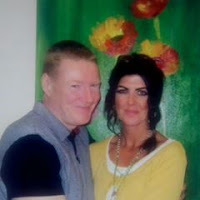 Siobhán McConville on behalf of the McConville Family hit out at erroneous reporting in press coverage of the Brendan McConville case.
Siobhán McConville on behalf of the McConville Family hit out at erroneous reporting in press coverage of the Brendan McConville case.The first relates to a claim by Kate Carroll that "the plastic bag which held the weapon was 100% proven to have been purchased and used by Brendan McConville."
This claim was first voiced by Kate Carroll during a radio interview for BBC radio Ulster's Talkback program on the 19-2-15 in which she stated that during the trial she had heard evidence that "the actual plastic bag that the gun was wrapped in was in Brendan McConville's home."
On that occasion the false allegation went unchallenged. However the resurfacing of this untruth, which appears to derive from both a misunderstanding of the facts by Kate Carroll and lazy journalism and fake news, now demands correction.
The evidence relating to a role of black plastic bags from which a bag purportedly used to wrap the gun used, in the shooting is said to have originated can be found at paragraph 23 of the Crown Court judgement delivered on 30-3-12 and available from the Courts And Tribunal Service.
This state's that there was "compelling evidence of a linkage between the bags used to wrap up the weapon and magazine and the bags located in 309 Drumbeg."
It should be noted that this address in Craigavon, from which the roll of bags was recovered from the yard 9 days after the shooting, was in no way connected to either Brendan or John Paul who were both resident in Lurgan at the time of the incident.
The second issue relates to a claim by The Sunday Life which states "before being shot dead by McConville who was lying in wait with a AK47 assault rifle." This bears a remarkable resemblance to a similar claim published in the Irish addition of The Sun newspaper on 9-3-16 which claimed Brendan McConville "armed with a AK47 assault rifle shot the police man in the head."
It must be pointed out that at no time was it claimed by the prosecution that Brendan fired the shot that killed Mr. Carroll. In fact the Court of Appeal accepted that there was no specific role ascribed to either Brendan or John Paul and this remained the case even when sentenced. This was further emphasised by the Court of Appeal in a question it submitted to the Supreme Court which included the phrase "in a case which the prosecution is insufficient to establish any specified role in a crime by the appellant and there is no direct evidence of any agreement with those involved in the murder. "
Furthermore, we take issue with Kate Carroll's claim that "it was proven that Witness M's eye sight had improved, as he had stated." After having been found to have lied to the court about being prescribed glasses, Witness M did claim that his eye sight had improved. However no recent eye sight examination was presented to the court to support this unsubstantiated claim.
While we have come to expect a degree of unbalanced reporting from the Sunday Life it is our view that the public are entitled to and should be provided with an accurate account of the facts.



Published on September 28, 2017 11:00
Shocking Situation
 From The Transcripts Martin Galvin speaks to Doire-based journalist Eamon Sweeney about current issues in Ireland: the protests over a British soldier being charged in a legacy case, the charges against Ivor Bell and Fianna Fáil standing candidates in the Six Counties.
From The Transcripts Martin Galvin speaks to Doire-based journalist Eamon Sweeney about current issues in Ireland: the protests over a British soldier being charged in a legacy case, the charges against Ivor Bell and Fianna Fáil standing candidates in the Six Counties.
Radio Free Éireann
WBAI 99.5FM Pacifica Radio
New York City
Audio Player ➽begins time stamp ~ 36:37
Martin: With us on the line we have the noted Doire-based journalist, Eamon Sweeney, who’s written for the Derry Journal, more recently with the Belfast Telegraph among other newspapers. Eamon, welcome back to Radio Free Eireann.
Eamon: Hi, how are you, Martin?
Martin: Okay. Eamon, I was looking at UTV News, on their website, today and there’s a story about a demonstration in London. And it supporters of a British soldier charged over the 1974 shooting of a man in The North. They are all demonstrating and gathering together in London. And they say that Dennis Hutchings is seventy-five and a long time has passed and there’s outrage and a number of people coming forward to say that these prosecutions against British troopers from so long ago should end. That he shot and killed, or is alleged to have shot and killed somebody, John-Pat Cunningham, in 1974. Alright, now yesterday – the reason we had booked you first – yesterday there was a court case involving a very prominent, well-known, very influential Republican from Belfast named Ivor Bell and he’s somebody now who, unfortunately, has some severe medical issues. Is somebody now over eighty years of age. This happened in a Belfast court and the Ministry of Defence (MoD) and the Prosecution Service was asked their position on this and it seemed to be very different from the way they feel about Mr. Hutchings. Could you tell us who Ivor Bell is and what happened yesterday in court regarding Mr. Bell?
Eamon: Well as you pointed out, Ivor Bell is a very well-known Republican from Belfast. He is alleged to be in a high-ranking member of the IRA back in the ’70’s. And the case that he’s involved in directly relates to one of ‘the disappeared’, Jean McConville, back in 1972 and this is over his alleged or accused involvement in that awful killing back forty-five years ago. In all that time has elapsed, however, no other member of the Republican Movement has ever been brought to book for this apart from Ivor Bell who’s undergoing these accusations. As you’ve also said, he has been diagnosed with dementia, he’s eighty-one years old and it seems very much at odds with the position on the opposite side of the coin with regard to potential prosecutions of British soldiers who killed people in The North as well. It’s a strange case in the round. The whole situation is a very strange situation because it goes to the nub of the political hiatus ongoing currently in Northern Ireland with regard to the reconvening of Stormont.
 Photo: Gareth Fuller, PA Wire from the Irish Times article here
Photo: Gareth Fuller, PA Wire from the Irish Times article hereWhilst talks are going on the only outstanding issue during all these talks and the consequent breakdowns has been the failure on all political sides to deal with the legacy of the past. And there are counter-demonstrations, mainly in Doire today, against the attempt to not prosecute the British soldier involved in the killing in South Armagh in 1974. And John-Pat Cunningham was twenty-seven years old at the time. He had special needs or special educational needs and that goes also to the heart of the killing of that young man all those years ago. But as you say there’s very different attitudes on both sides of the coin towards the prosecution of people both from the paramilitary side of things and from the British state side of things. If you tie that in I mean the Public Prosecution Service (PPS) in Northern Ireland has had the findings related to the re-investigation of Bloody Sunday in their hands now for around six months after the Police Service here carried out a re-investigation with a view to, potentially, prosecuting British soldiers who were present at Bloody Sunday for murder. Now we all know what happened on Bloody Sunday – there’s no need to regurgitate the details of that – the consequent twelve year inquiry – but those findings have not been given an opinion on either way by the Prosecution Service so this issue again is raising its head. It’s raising its head with regard to the prosecution, or not, of British soldiers. Now you see Ivor Bell is going to be prosecuted despite his medical condition. And that’s the standing at the minute and sure there’ll be a legal challenge from his legal team on that. But that’s the way it stands this afternoon in Northern Ireland. There have been various counter-demonstrations to the one by the British forces in London this afternoon. It seemed to be pretty well attended so yet again there’s no resolution forthcoming in any sense or any reconciliation in any sense with regards to dealing with the past either in terms of the community coming together or a legal sort of streamlining of this at all. There seems to be no real sort of leveling of the playing field for anybody concerned. And it’s a shocking situation. I can’t see how political progress can be made in Northern Ireland unless this issue is satisfactorily dealt with for everyone on all sides soon.
Martin: And we should have mentioned: Ivor Bell is just charged with encouraging persons not before the court to commit certain actions or endeavouring to persuade persons not before the court meanwhile Mr. Hutchings is charged with actually firing the shots which killed Mr. Cunningham so many years ago. But…
Eamon: …Yeah…
Martin: …we want to go on to a couple of other topics: Number One, during the week there was a group called the Red Hand Commandos who have applied to be legalised and it’s said they want to get involved with community work and maybe grants – could you tell us who the Red Hand Commandos are that are now seeking to be legalised and seeking to get some kind of legal status and perhaps some community work?
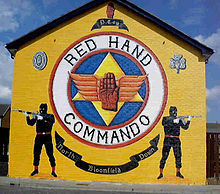 Red Hand Commando mural in Bangor
Red Hand Commando mural in BangorRHC deproscription application statement here
Eamon: Well as the name probably indicates to your listeners the Red Hand Commando (RHC) were a Loyalist, or are, a Loyalist organisation that sprang up around 1972-1973. They were heavily recruited from the young tartan gangs which were again young Loyalists operating in Northern Ireland at the time right at the outset of The Troubles when the times were particularly bad on the ground. They were then basically subsumed into the Ulster Volunteer Force (UVF), a much better as you well know, widespread organisation across The North and operated on their behalf on many occasions and they allowed the Ulster Volunteer Force to basically claim killings in their name whilst they were carried out, in fact, by the Red Hand Commando. They were a particularly secretive type of organisation within Loyalism. They were sort of hand-picked, cherry-picked if you will, from Loyalist organisations and taken into the wings of the Red Hand Commando. Now they are officially credited with killing twelve civilians during The Troubles and one of their own members so they’re officially credited with thirteen murders but it’s more widespread in that because the Ulster Volunteer Force are credited, for want of a better word, with five hundred murders during the gamut of The Troubles. So they were involved heavily in sectarian assassinations and like all the other paramilitary groups in some particularly heinous killings – you know, that paramilitary groups on both sides carried out. But what happened then recently is that because they are a proscribed organisation, ie banned and it’s illegal and punishable by jail to be a member of such an organisation, they’ve applied to the British government to become a legal organisation still carrying the same name, the Red Hand Commando. And what they want to do, they say, is channel themselves into community work and community development within the Loyalist community. Now, as you would imagine, there’s been a quite a hefty outcry from all quarters of the community.
The Unionist community have been just as scathing of this attempted move as the Republicans or Nationalists have. They don’t want basically to see anybody claiming in the name of Unionism or Protestantism funding for community development when they basically outcried what happened supposedly in their name for all those years. So that decision is still ongoing. It’s attracted a great deal of attention. So what you basically have here are guys who are allegedly still involved in criminality, drug dealing and so on, who are posing, or attempting to pose themselves, as community development workers within their own community. So it’s a very strange one and particularly in Europe, at this stage, it’s probably a unique facet of Northern Irish society as we stand at the moment but it remains to be seen whether that the British government will actually give them that. That means if they are accorded the status of a community development group they will be liable and completely open to funding from the British government or any other form of funding around – probably Europe as well. It’s been said that despite Brexit, for example, in the next eighteen months, that streams of European funding will still be made available to groups in Northern Ireland probably through the government in Dublin and that’s how they will be funded. So it’s a strange, strange situation that twenty years after the Good Friday Agreement that was supposed to do away with all this stuff that guys are still trying to channel money into organisations like that – it’s frankly offensive to the vast, vast majority of people on all sides in Northern Ireland that a group who carried out sectarian murders is now going to set itself up as a community development organisation. It’s anathema to any right-thinking mind in society I would say.
Martin: Okay. Now the next thing we wanted to speak to you about: You wrote a story this week for the Belfast Telegraph about Fianna Fáil. Now Fianna Fáil is one of the main parties. In fact it’s been in government in The South more so than any other political party in the south of Ireland since the inception of the Twenty-Six County’s state of independence. They are making moves to come north into the Six Counties which is something that hasn’t happened for a number of years. Could you tell us first what’s going on and why this is really significant?
Eamon: Well I think the significance of it has been sort of missed in general by everybody in The North at the moment. As you say we got our hands on the story and printed as did the Irish News, in fact. But what happened is that next month during their Ard Fheis, their annual conference, there will be an election to what Fianna Fáil now term the Committee of Fifteen, which is their national executive. On their national executive there’s a seat for one person from the North of Ireland. There are two names that have gone forward to claim that seat. One is that of a former SDLP (Social Democratic and Labour Party) Lord Mayor of Belfast, a man named Pat McCarthy and the other is Sorcha McAnespy, who’s a former Sinn Féin Councillor on Omagh and Fermanagh District Council and they have admitted that their names have gone forward for that. But what makes it more significant is that for the first time in many, many decades Fianna Fáil seem serious this time about placing candidates up for election at the next council election which are scheduled to take place in The North in 2019. Now that immediately brings pressure to bear on the other Nationalist parties operating in The North, ie Sinn Féin and the SDLP. Now the SDLP in particular may find themselves under even more electoral pressure as Fianna Fáil manage to place candidates successfully for election inside Northern Ireland. It’s quite a significant move. As Pat McCarthy told me when I interviewed him for the Belfast Telegraph it’s about offering Nationalist another alternative to an all-Ireland dimension, ie an alternative to Sinn Féin. They operate of course as you know as an all-Ireland party inside the Thirty-Two Counties of Ireland. The SDLP have always been a party which operated solely inside Northern Ireland so they’ve been quite damaged recently in terms of elections so even at the local level if Fianna Fáil manage to place candidates – and I know, in the background, that they have approached quite a number of people for standing at the next council elections – and it immediately places them on the back foot.
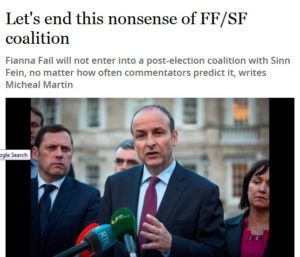 Independent.ie
Independent.ie3 September 2017
Photo: Arthur Carron
What’s in it for Fianna Fáil? Potentially they know that they may be the major partner in government next time around in Dublin – there’s a general election due there within the next two years – it may be to offset the advances, electorally, that Sinn Féin have made down South. They may actually need, despite all the noises about not doing this for many years, Sinn Féin to operate a government next time in Dublin. So it may be quite a pragmatic move in terms of politics for Fianna Fáil but nevertheless it’s highly significant that after all the years of making noises about representing Nationalists in The North it seems, at this stage at least, this time, that they are prepared to do it. They have contested elections in the past inside Northern Ireland. One of the founders of the party, an incredibly well-known figure in Irish history of course, Éamon de Valera, stood in 1933 for Fianna Fáil in the South Down constituency for Stormont. Now, whilst …
Martin: …Eamon, Eamon – I’m sorry – we’re going to have to leave it there. He was, I know, banned from The North because when I was banned they wrote a story about the same thing happened to Éamon de Valera. I don’t have anything else in common with him. But he actually tried to visit his constituency and was shipped back. But we’re going to be watching this. This has the potential for some really important impact. Eamon, I want to thank you for being with us, talking to us about Ivor Bell’s case, about the Red Hand Commandos and certainly for writing and for talking to us about Fianna Fáil and what this may mean in terms of Republican politics from the South of Ireland reaching over into The North. Alright. We’re going to have to leave it there. Thank you very much, Eamon.
Eamon: Not a problem, Martin. Bye-bye.
➽ends time stamp ~ 52:01


Published on September 28, 2017 00:00
September 27, 2017
When The Dust Settles
 Enda Craig writing @ Buncrana Together slams R2W politicians over their management of the anti-water charges movement.
Enda Craig writing @ Buncrana Together slams R2W politicians over their management of the anti-water charges movement. Why? Well because it’s like trying to close the gate after the horse has bolted. It’s merely a distraction, just playing to the gallery and the media or another way to look at it ‘electioneering’. The time for the R2W politicians to take a stand is long past.
 Paul Murphy, Solidarity TD and Eoin Ó Broin , Sinn Féin TD are both former members of the Oireachtas Committee on Funding Domestic Water. Being from legal backgrounds they will understand the significance of the omission of any mention of the 'Established Practice' clause in the committee's report and indeed the ramifications of a possible Judicial Review.
Paul Murphy, Solidarity TD and Eoin Ó Broin , Sinn Féin TD are both former members of the Oireachtas Committee on Funding Domestic Water. Being from legal backgrounds they will understand the significance of the omission of any mention of the 'Established Practice' clause in the committee's report and indeed the ramifications of a possible Judicial Review.For instance, I could go back to February 2016 when after the General Election there was an great opportunity to take a stand and refuse to accept any move to diffuse the momentum of the anti-water charges movement. Instead the so called R2W politicians accepted and even encouraged the establishment of a so called Independent Water Commission and an Oireachtas Committee on Funding Domestic Water. One hundred years after the 1916 Irish Rising the leadership could have once again taken a stand but instead they took part in the establishment's subterfuge.
After the 2016 General Election a Fine Gael and Fíanna Fáil 'Programme for Government' was devised and agreed. This was clearly set up to counteract the mass opposition to Water Charges and take the wind out of the sail of the successful campaign. The tactic was devised not only as a result of the General Election where the result was directly influenced by the mass opposition to water charges but also it was necessary because of the European Commission’s Eurostat's classification of Irish Water in July 2015 the previous year. The Eurostat decision not to allow Irish Water to go off the State's books must have shocked the establishment.
Again this came about through the national anti water charges' movement and their refusal to accept Irish Water and pay water charges. No doubt Fine Gael needed to save face and devise a different approach one that might take longer but one that will ultimately get them what they wanted. Thus was born 'the 'charging for excessive use' approach presented to them on a plate by Sinn Féin in their R2W European Citizen Initiative in 2015. The Programme for Government, including the suspension of charges, the Independent Expert Committee and the Oireachtas Committee on Funding Domestic Water, was also in line with that presented by Fíanna Fáil’s Barry McGowan at the McGill Summer School in Donegal in the Summer of 2015 where he said:
Fianna Fáil maintains its call for the immediate suspension of charges. Domestic charges should only be introduced when the national infrastructure is brought up to standard.
After the general election the R2W TDs should have run a mile from such an establishment plan. However, they ran the other way, straight into its arms, not only taking part, but in my view they aided and abetted the Government tactic for their own political ends.
We have now witnessed this agenda coming to fruition as the ‘ongoing opposition to water charges' where the establishment left, particularly Sinn Féin and Solidarity and People Before Profit can now dine out on it for the foreseeable future sniping at the heels of Fíanna Fáil. Even the R2W Union leadership are in on this politically lucrative ‘permanent opposition to water charges’ act. The old adage ‘never trust a politician’ comes to mind or as Richard Armour said:
Politics, it seems to me, for years, or all too long, has been concerned with right or left instead of right or wrong.
However, it is the more recent Oireachtas Committee on Funding Domestic Water, who eventually delivered it’s controversial report last April over a year since the General Election that shows up the duplicity of it’s members including the R2W TDs. The Committee was nothing short of playing to the grandstand where it’s members including the five R2W TDs were clearly basking in the limelight in the public sessions but in it’s 21 private sessions it was an altogether another affair.
This duplicitous grandstanding was clearly demonstrated by the lack of any mention of the Ireland’s 9.4 Exemption or indeed any mention of the full day session of February 15th. Anyone genuinely supporting the mass movement would have been up in arms at this omission and clearly the February 15th session showed that they all knew how important the question of Ireland's 9.4 or 'Established Practice' was.
Judicial Review, show by actions and not words
I asked a legal friend of mine for his opinion about the exclusion of the 9.4 Exemption and the February 15th session from both the ‘Confidential Final Draft Report’ or the ‘Final Report’ of the Oireachtas Committee on Funding Domestic Water Charges. He advised that a Judicial Review against the Government for the non-inclusion is indeed very possible. The fact that 'Established Practice and the 9.4 Exemption' was given one full day of debate, including submissions of two Senior Counsel, establishes that this sector of discussion as "Material Information" and by normal legal right should have been included in the reports.
If any of the R2W TDs or R2W Union bosses had the slightest interest in retaining the 9.4 Exemption they could have and should have instigated a Judicial Review back in April 2016 to save the 9.4 Exemption and have it inserted in the Committee's report as of right.
No one would know this better than Deputies Eoin Ó Broin and Paul Murphy with their extensive legal knowledge. Instead they have been encouraging ' meaningless ' River Basin Management Plan submissions and proclaiming their bona fide anti-water charges credentials in the Dáil.
Maybe I could suggest to them that an opportunity still is available until October 6th to save the 9.4 Exemption when the Statute of Limitations runs out on a Judicial Review.


Published on September 27, 2017 10:00
Commemoration For Hare And Adela
David Cotter, Committee Member, On the behalf of The Adela-Hare Centenary Commemoration Committee, invites people to an upcoming commemorative event in Dublin.
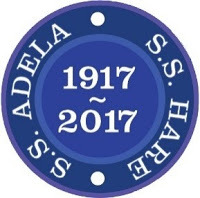
Dear Friend,
You are cordially invited to join descendants of crew-members, along with local heritage and community organisations, to commemorate and remember the loss of two ships that have a strong historical association with Dublin Port and the Docklands area.
In December 1917, two merchant ships - the SS Hare and the SS Adela were torpedoed by German U-boats and were lost in the Irish sea during the First World War. Thirty-six lives were lost on the 14th December and 27th of December 1917, an awful tragedy for their families, but also having a huge impact on the Dublin Docklands community, where many of these victims resided and worked. Several crew members survived and they too are equally deserving of our remembrance. These individuals have never been forgotten by their families but their stories need to be told to a wider audience.
It is only right and proper that one hundred years on the Docklands communities with the support of Dublin City Council, Dublin Port Company and others take the initiative to remember and commemorate these two Ships and all who sailed with them on their last and final journeys.
Our commemoration event will take place on Saturday 30th September 2017, assembling from 12.30 p.m. for a 1.00 p.m. start at the at the Dublin City Council’s Offices (the former DDAA Offices) on Custom House Quay near the Sean O'Casey Bridge (North Side) and opposite ‘The CHQ Building’. A commemorative plaque will be unveiled here to the SS Hare while also remembering the role the Ship played in 1913 with the bringing of much needed food supplies to the families of the striking workers during the ‘Great Lockout’.
Afterwards, we will proceed across the River Liffey where a second commemorative plaque will be unveiled to the SS Adela at the Campshire Buildings close to the Ship’s original berth on Sir John Rogerson’s Quay. These commemorative plaque unveilings will be officiated by Ardmhéara and Honorary Admiral of Dublin Port, Councillor Mícheál Mac Donncha (The Lord Mayor of Dublin City).
We will then adjourn to the nearby Clayton Hotel, off Cardiff Lane (around the corner from Sir John Rogerson’s Quay) for the launch of a once off commemorative booklet and exhibition panels to mark this very historic and special occasion. This will be officiated by Ms. Lucy McCaffrey, the Chairperson of Dublin Port Company. Light refreshments will be served.
All are welcome to this important commemoration, as the citizens of Dublin pay a respectful tribute to the memory of those Mercantile Marine members who showed such bravery and determination and who put their lives at risk bringing much needed supplies back and forth across the Irish Sea to sustain this City in a time of conflict and who became innocent victims of war.
Hoping to see you there on the day!
Yours sincerely,
David Cotter,
Committee Member,
On the behalf of The Adela-Hare Centenary Commemoration Committee.
The Adela-Hare Centenary Commemoration Committee,
c/o 114-116 St. Andrew’s Resource Centre,
Pearse Street,
Dublin 2.
Mobile No.: 086-4089611
E-mail: adelahare1917@gmail.com
Facebook: https://www.facebook.com/adelahare1917/
Promotional Video: https://www.youtube.com/watch?v=NH-Oqfh_Uy8
Supported by: Dublin City Council Decade of Commemorations Fund





Dear Friend,
You are cordially invited to join descendants of crew-members, along with local heritage and community organisations, to commemorate and remember the loss of two ships that have a strong historical association with Dublin Port and the Docklands area.
In December 1917, two merchant ships - the SS Hare and the SS Adela were torpedoed by German U-boats and were lost in the Irish sea during the First World War. Thirty-six lives were lost on the 14th December and 27th of December 1917, an awful tragedy for their families, but also having a huge impact on the Dublin Docklands community, where many of these victims resided and worked. Several crew members survived and they too are equally deserving of our remembrance. These individuals have never been forgotten by their families but their stories need to be told to a wider audience.
It is only right and proper that one hundred years on the Docklands communities with the support of Dublin City Council, Dublin Port Company and others take the initiative to remember and commemorate these two Ships and all who sailed with them on their last and final journeys.
Our commemoration event will take place on Saturday 30th September 2017, assembling from 12.30 p.m. for a 1.00 p.m. start at the at the Dublin City Council’s Offices (the former DDAA Offices) on Custom House Quay near the Sean O'Casey Bridge (North Side) and opposite ‘The CHQ Building’. A commemorative plaque will be unveiled here to the SS Hare while also remembering the role the Ship played in 1913 with the bringing of much needed food supplies to the families of the striking workers during the ‘Great Lockout’.
Afterwards, we will proceed across the River Liffey where a second commemorative plaque will be unveiled to the SS Adela at the Campshire Buildings close to the Ship’s original berth on Sir John Rogerson’s Quay. These commemorative plaque unveilings will be officiated by Ardmhéara and Honorary Admiral of Dublin Port, Councillor Mícheál Mac Donncha (The Lord Mayor of Dublin City).
We will then adjourn to the nearby Clayton Hotel, off Cardiff Lane (around the corner from Sir John Rogerson’s Quay) for the launch of a once off commemorative booklet and exhibition panels to mark this very historic and special occasion. This will be officiated by Ms. Lucy McCaffrey, the Chairperson of Dublin Port Company. Light refreshments will be served.
All are welcome to this important commemoration, as the citizens of Dublin pay a respectful tribute to the memory of those Mercantile Marine members who showed such bravery and determination and who put their lives at risk bringing much needed supplies back and forth across the Irish Sea to sustain this City in a time of conflict and who became innocent victims of war.
Hoping to see you there on the day!
Yours sincerely,
David Cotter,
Committee Member,
On the behalf of The Adela-Hare Centenary Commemoration Committee.
The Adela-Hare Centenary Commemoration Committee,
c/o 114-116 St. Andrew’s Resource Centre,
Pearse Street,
Dublin 2.
Mobile No.: 086-4089611
E-mail: adelahare1917@gmail.com
Facebook: https://www.facebook.com/adelahare1917/
Promotional Video: https://www.youtube.com/watch?v=NH-Oqfh_Uy8
Supported by: Dublin City Council Decade of Commemorations Fund




Published on September 27, 2017 00:00
September 26, 2017
The Left And Islamism – A Curious Tale
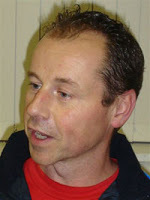 Matt Treacy writing @ Brocaire Books last month took the Irish Left to task for its perceived dalliance with Islamism.
Matt Treacy writing @ Brocaire Books last month took the Irish Left to task for its perceived dalliance with Islamism.It was perhaps unfortunate that a protest in support of Ibrahim Halawa ought to have coincided with the Islamist mass murder in Barcelona. It was also interesting that the RTE report on the protest for its 6 o’clock TV news was amended by 9 o’clock to omit the earlier reference to the Taoiseach’s call for Halawa’s release.
Exactly why a gay man like Varadkar should support a member of what one journalist has described as “Muslim Brotherhood aristocracy” is another matter. Halawa’s close friend and political ally Al Qaradawi has variously supported the lashing, imprisonment and worse of gays.
Al Qaradawi is the President of the European Council for Fatwa and Research which we Irish, who the Islamists must view in the same way as Lord Sauron regarded the innocent Hobbits of the Shire, host at Halawa’s mosque in Clonskeagh. Halawa senior is the Secretary General of this august body which among other attributes promotes the anti Semitic forgery The Protocols of the Elders of Zion as history. Al Qaradawi is banned from the Egypt, the US, Britain, France and elsewhere and was refused entry to Ireland in 2011.
The views of the ECFR, and its Muslim Brotherhood progenitor, on gays are not its sole claim to medievalism. It shares with Hamas, which is in effect the Palestinian manifestation of MB, a burning hatred of Jews, and support for the eradication of Israel and Jews. Qaradawi has claimed that Allah has always punished the Jews and that the “… last punishment was carried out by Hitler.” MB supported the granting of asylum in Egypt to the Grand Mufti of Palestine, Nazi collaborator al Husseini, pictured above with their good friend, the national socialist Adolf.
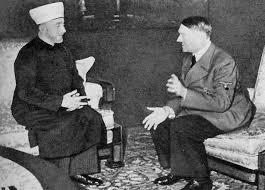
While not directly associated with IS and Al Qaeda. the Brotherhood shares many if not most of its ideological positions, although it feigns support for democracy as part of its efforts to insinuate itself into western states. It’s actual aim, as outlined by one of its leaders, is “… a kind of grand jihad … eliminating and destroying the western civilization from within and sabotaging its miserable house.” It would appear to have strange allies in that mission, although the ultra left shares the same contempt for western tradition and democracy.
Bin Laden’s successor as leader of Al Qaeda. and the person alleged to have been a key organizer of 9/11 and other atrocities, is the Egyptian born Ayman al Zawahiri, who is a former member of MB.
The Muslim Brotherhood and Hamas certainly make strange bedfellows for the feminist left. Qaradawi has said that women who have been raped are only “absolved from guilt” if they have shown “some form of good conduct.” He defends wife beating as a “method of last resort,” presumably if all the other forms of abuse have failed.
Prior to their coming to power in 2012 the MB representatives in parliament opposed a proposal to grant equal citizenship to non Muslims and to women. Following Morsi’s election as President they refused to ratify the UN declaration on violence against women, and attempted to legalise Female Genital Mutilation. When that met with popular resistance, they encouraged the establishment of illegal clinics where the barbaric practise could be carried out. Following their overthrow a doctor from one of the Islamist clinics was prosecuted over the death of a 13 year old girl who had been subjected to the atrocity.
As opposition to MB grew in 2013 it embarked on a vicious campaign against Coptic Christians, the left which had been the target of anti trade union legislation, women teachers and doctors and anyone else deemed to be harám. Following the popular coup, MB escalated its violence, murdering hundreds and burning churches and non Islamic public facilities.
It was in the midst, and in support of. all this that the Halawa siblings became minor celebrities in Cairo. Although allegedly caught up in events as innocent holiday makers, it is clear that they were invited to speak at mass MB rallies as representatives of their father who is well known in Egypt as an ally of Qaradawi. Up until their arrest their Facebook pages made no secret of their allegiance to MB and support for Hamas.
While his naïve supporters are fond of trotting out the cliché that if Halawa was named Murphy or was not “brown” that the government would do more for him, thus implying that any sceptics are automatically “racist,” Ibrahim himself several times described himself as an Egyptian living in Ireland. Which is his prerogative. I doubt that Seán MacStiofáin or Shane MacGowan considered or consider themselves to be anything other than Irish despite their place of birth.
Given its reactionary views it is all the more strange that Varadkar and most of the Irish left should be so vocally in support of someone associated with the Muslim Brotherhood. It is entirely bizarre that self proclaimed “anti fascists” and feminists become almost hysterical if anyone questions their advocacy of someone who is an adherent of a movement and ideology that has more in common with Nazism than any semblance of western leftism in its prelapsarian manifestation and embrace of post modern “identity politics,” let alone western democracy.
Indeed it ought to be posed to Halawa’s leftist supporters whether they would be similarly worked up over say an Irish born Polish fascist who returned to the land of his antecedents to take part in a coup. One doubts it somehow.
The means by which the Egyptian Republic resist Islamic barbarism may not be to the taste of citizens of a western democracy, but they are hardly obliged to treat MB with kid gloves, let alone facilitate their revival.
In the aftermath of yet another Islamist assault on western civilization perhaps some people might reconsider their support for the ideological siblings of IS.
Or perhaps some believe that the price of Ireland being thus far immune from Islamic terror is worth the cost of allowing this country to be one of the European centres of jihadist logistics, finance and propaganda. Even that no doubt has its limits.
➽Matt Treacy’s latest book, A Tunnel to the Moon , will be launched in September and is available to buy through the following sites:
Lulu
Amazon


Published on September 26, 2017 12:00
Éire Nua, : Unionism’s Last Hope?
 Finnian O Domhnaill advises unionism to embrace Eire Nua before the opportunity is lost. Finnian O Domhnaill is a political writer from Donegal, currently living in Derry. He is the creator of the political page No Bones About It.
Finnian O Domhnaill advises unionism to embrace Eire Nua before the opportunity is lost. Finnian O Domhnaill is a political writer from Donegal, currently living in Derry. He is the creator of the political page No Bones About It.Some say it will come in ten years, some say twenty, others say one hundred, while doubters say never!! but it cannot be denied anymore that a united Ireland is coming and for Unionism, it must weigh up its options.
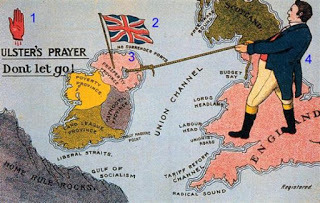
There seems to be two strands of unionism from those in the unionist parties. One looks into the eyes of their voters or down the barrel of a camera lens and tells them that the union, that is ‘"our guiding star", is safe and so long as unionism remains the majority, "Northern Ireland" will remain part of the United Kingdom. Then there is a second strand, where backstage, the cameras are off and the voters are gone, the trembling, Fenian fearing unionists come out of TV Lala land and are slammed back into the reality that Irish unity is growing and growing fast.
Unionism knows that a united Ireland is coming but they also know that they cannot in any way bow to that fact or concede to it because their voters would chastise them if there was any mention to openness towards a united Ireland. Unionism seems trapped on the other side as well. If they don’t engage in dialogue with the ever increasing majority of those seeking Irish Unity, they will have no place at the table and less, say, in shaping Ireland’s future: therefore no say in shaping theirs.
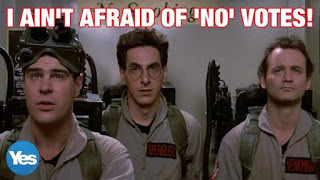
Unionism today is the ghost busters staring up at Vigo the Carpathian saying "we ain’t afraid of no votes" with a big "gulp". As the unionist majority has slipped from their finger tips in the north, Brexit looming, more Tory cuts coming, businesses already venturing down south and more on the way, a rising surge of Sinn Fein both North and South, Fianna Fail, Fine Gael, SDLP all upping their support for unity, a possible Corbyn-led Labour government in the coming years, Indy red 2 for Scotland, unionism should be afraid, very afraid or should they?
In my view, there is one option that could be the best deal for unionism in a united Ireland. A proposal offered by Ruari O Bradaigh in the early 70’s that was cast aside by Gerry Adams and sent to the echelons of republicanism. That proposal was of course Éire Nua.
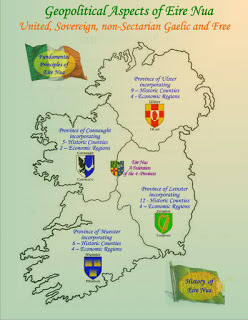
This new Federal Ireland will encompass a parliament in the Ulster province, giving unionists a self governing body that will manage, this time. the whole of Ulster instead of the majority protestant unionist six county statelet. Orange, loyalist, protestant and unionist culture can be protected and recognised by the central parliament of Ireland. Their affinity to the English Queen and deep relationship with Britain can and should never be stamped out of society by anyone, as expressing ones opinion, tradition, religion or culture is something that lays in the heart of socialism and republicanism.
What this idea of a federal Ireland gives is not a compromise by either side as one may think but a broadening and expansion of both unionism as well as nationalism. Republican nationalists will have a new Ireland, an Ireland where they can do away with the old system that was brought in by the British government and never recognised fully as a republic by republicans of Sinn Fein. Unionism will finally have all of Ulster back in its hands to manage and shape it’s future of 2 million Ulster men and women with its new provincial parliament.
The link between unionists and Great Britain can never be severed regardless of partition or unity for it is the Ulster People themselves, not the land around them that holds the link with Ulster and Britain. That is something that can never be taken away. The tall tale of isolation, feeling of abandonment, cultural, social and religious oppression and economic catastrophe can all be put in the archives where they belong as these issues are old, outdated and are no longer the case in a modern more inclusive world and is only used as tactics to stir up the centuries old fear that has resonated through generations since plantation by those who profited and still wish to keep their profit from partition going.
In my opinion, these myths must be dispelled not just by nationalist socialist republicans but by members of the unionists communities as well. The Éire Nua, idea should also be discussed within the unionist communities, debated and shared out and challenged by unionists. It should be noted that at the height of the IRA’s bombing campaign, Ruari O Bradaigh gave this proposal to prominent unionists, should a united Ireland come about and said it would be the most appealing option. Even then, Éire Nua, was seen as the best idea for unionism.
I believe that part of the healing process of the conflict and all that came with it and all that came before it, involves uniting the island as ending one chapter and starting another. For Irish unity in my eyes is not the end goal but only the beginning. Only then can we all start to drift from the past and grow and build on that healing. I believe that Éire Nua, gives us that chance, that chance through the democratic process and as stated previous, without compromise by either side. So let us all go forward and seek out this new way of living using the ideas of the past.
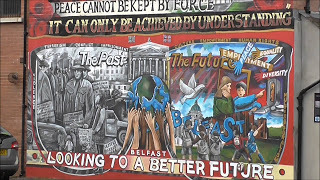


Published on September 26, 2017 00:00
September 25, 2017
Don't Get Sick In Thurrock
 Mick Hall @ Organized Rage discusses the decline in the National Health Service as experienced in Thurrock.
Mick Hall @ Organized Rage discusses the decline in the National Health Service as experienced in Thurrock.Thurrock once had four hospitals, despite its population having doubled since then we may now end up with none
Thurrock once had four hospitals in the borough, Orsett, Tilbury, South Ockendon and Stifford Clays, despite the population having doubled, if not more since the 1950's. We may now end up with none.
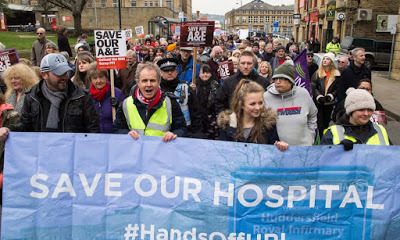 Protesters marched through Huddersfield in fight to save the town’s accident and emergency unit.
Protesters marched through Huddersfield in fight to save the town’s accident and emergency unit.Back in July Thurrock Councillors unanimously backed a motion that no changes should take place at Orsett Hospital without new local health services being built within Thurrock beforehand.
However if you read the statement issued by Tory Cllr James Halden, portfolio holder for Education and Health after the motion was passed the situation is less clear:
Clinical services in Thurrock – which our residents rely on and value – must be maintained and improved. Just preserving the status quo is not good enough.The problem with this is the current status quo is a fully functioning Orsett Hospital. Does Cllr James Halden, like Jackie Doyle Price MP, despite his fine words actually support closing the hospital if they're replaced by so called Super Health Hubs which supposedly will be opened across the borough?
If so what medical facilities will these new health hubs provide? Councillors don't seem to know, or, if they do they are not telling their constituents.
We do know if the hospital is closed the Eye Unit at Orsett will not be part of the Hubs, and it's likely to be transferred to Southend. Which will mean the elderly patients who are the majority of those who attend the unit for cataract day surgery will have to make a journey of 22 miles each way.
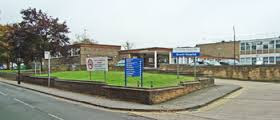
Nor will they in all probability provide NHS consultant appointment services. If your GP refers you to a consultant or for an X-ray, I'm presuming we will have to travel to Basildon Hospital or further afield.
As far as I can see the so called super Hubs are not that super. If they actually materialise they will provide much the same services the best of Thurrock's GP's already provide, blood tests, minor injuries and operations, plus less invasive ultrasound scans, etc.
What also worries me most about these Hubs is who will be contracted to run them - will they be private health-care companies? They look very much like yet another sleight of hand NHS privatisation, as the idea originated from the USA’s notoriously costly and flawed private health-care system.
Closing local hospitals like Orsett and replacing them with 'health hubs' in partnership with local councils are at the heart of the STP's cost cutting agenda.
Of 450 senior hospital doctors surveyed by the Hospital Consultants and Specialists Association (HCSA), 42% believe the Sustainability and transformation partnerships, (STP's) will have a negative impact on patient care. Barely one in ten consultants who belong to the union expect a positive impact. Three in four (77%) fear STPs are a way of making cuts to the NHS, while just over half (56%) fear they will lead to job losses and worse understaffing.
Overall 95.81% of hospital doctors felt that STPs were not being created in a transparent or open manner, with nearly two-thirds fearing this a lack of clinical engagement could have a negative impact on patient care.
We're told Basildon and Thurrock University Hospitals NHS Foundation Trust will soon be consulting with local residents on the future of Orsett Hospital. It's imperative we make it clear Orsett should remain open.
Who wouldn't want a shiny new 21st century health care Hub just down the road? But until the Trust tell us which services they will provide, and who will be contracted to run them, we would be wise to stick with what we currently have at Orsett hospitals. I have lived long enough in Thurrock to know when officialdom offers something which appears to be much better than what already exists, it's wise to poke it with a very long stick as they often have an ulterior motive which is not beneficial to us, or in the long term these facilities fail to materialise.
The way forward
Recently there were threats to close the A&E at Southend hospital, local people joined together and mounted a successful campaign to keep it open. Thurrock's people must wake up to the fact if they do not organise a similar struggle to keep Orsett hospital open it will close. And in my life time Thurrock will have gone from having four hospital to none.
As the great Frederick Douglass once said:
"Power concedes nothing without a demand, it never did and it never will."


Published on September 25, 2017 11:30
Kincora Can Of Worms
 The Protestant Loyal Orders, especially the Orange, should embrace its specific rich history with the Irish language instead of going down the road of promoting the Ulster-Scots dialect. In his latest Fearless Flying Column, controversial political commentator, Dr John Coulter, asks if there is another motive for the Order seemingly turning its back on the Irish language.
The Protestant Loyal Orders, especially the Orange, should embrace its specific rich history with the Irish language instead of going down the road of promoting the Ulster-Scots dialect. In his latest Fearless Flying Column, controversial political commentator, Dr John Coulter, asks if there is another motive for the Order seemingly turning its back on the Irish language. After all, it’s only a matter of a few decades that the annual Belfast Twelfth demonstration played host to Ireland’s Heritage lodge, which had the Irish language proudly emblazoned on its banner.
Let’s also factor into this debate the fact that some sections of Christian fundamentalism have been exceptionally vocal in condemning the annual Belfast gay pride march.
But some of these same Bible thumpers have been strangely quiet when it comes to demanding a full-scale Stormont (that’s if we had a working Assembly in the first place!) inquiry into one of the biggest homosexual abuse scandals in the North – Kincora Boys’ Home in East Belfast.
The Orange went purple with rage when leading global gay rights campaigner Peter Tatchell once suggested the Order’s icon King Billy was queer.
This was probably Pink pay back because of Paisley Junior and Iris Robinson’s utterances on homosexuality.
The Order, Christian churches and DUP MLAs especially could round off the North’s future week of Pink by exposing Orange involvement in the Kincora scandal. Is this the real reason why the Order is so opposed to any Irish Language Act? If the Order was to boast about its rich Irish language roots, up pops the ghosts of Kincora.
The main focus has been on the activities of William McGrath, the home’s house father, dubbed the Beast of Kincora because of his paedophile convictions for sexually abusing young boys in his care.
Although McGrath was jailed for his heinous crimes in the 1980s, when he died of cancer years later, he took many secrets to his grave – including whether Kincora was actually a British intelligence ‘sting’.
In his heyday, McGrath had been an influential figure within the Protestant community. As Kincora house father, he would have known who was allegedly abusing the young boys.
McGrath, notorious for his Hell-fire sermons and Bible classes, formed his own loyalist terror group, Tara. It campaigned for all Catholic chapels and schools to be closed.
He was especially active in the Orange, and was a leading member of Ireland’s Heritage, one of the few lodges to have the Irish language on its banner.
He was also viewed as a British agent, reportedly using his position in Kincora to gather intelligence on the private lives of key people in the Unionist and Orange community.
And anyone with serious knowledge of the Kincora ‘sting’ got mysteriously murdered.
Could that be why activists might hesitate about lobbying Stormont MLAs for an Assembly inquiry?
One of the North’s most openly gay loyalists was John McKeague, editor of the anti-Catholic hate sheet Loyalist News, and founder of the vicious death squad The Red Hand Commando.
As an active homosexual, McKeague must have known about the Kincora scandal. But before he had the chance to ‘blow the whistle’, the INLA shot him dead outside his shop in January 1982 deep in the heart of loyalist East Belfast.
A matter of weeks earlier in November 1981, South Belfast Unionist MP Rev Robert Bradford was murdered by the Provos.
One theory is that Bradford was ‘taken out’ because he had information on the alleged Kincora spy ring and was about to use his Parliamentary privilege to name names.
Some of the biggest political names in Unionist and British politics were linked to Kincora, either involved in the activities or knew about the abusers. They are now all dead.
These included top English blue blood Louis Mountbatten, killed by an IRA bomb on his boat in 1979, as well as exposed Russian spy Anthony Blunt.
In Ireland, similar fingers of suspicion about their knowledge of Kincora were pointed at former South Antrim MP Knox Cunningham, former Orange Grand Master John Bryans, former Belfast County Orange boss Tom Passmore, and ex-North Down MP Jim Kilfedder; again all dead.
Two themes linked all the dead, except Bradford – their alleged closet homosexuality and their keen interest in the extreme Right wing cult of British Israelism.
This cult maintains Ulster Protestants are descended from the Biblical lost tribes of Israel. Bradford, though, was a known British Israelite and may have stumbled on the Kincora links through this.
The big question remains – how much did senior figures within Unionism, the Orange Order and the Bible bashing churches know about Kincora?
With same-sex marriage now the hot topic for debate, let’s shed a spotlight on one of the darkest episodes in Ireland’s grim past and re-open the Kincora can of worms.
Follow John Coulter on Twitter @JohnAHCoulter


Published on September 25, 2017 01:00
September 24, 2017
Dónal Billings Hunger Strike Over
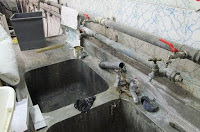 A statement from E3/E4 Republican Prisoners in Portlaoise welcomes the ending of the hunger strike by Dónal Billings and welcome him back to E-Block.
A statement from E3/E4 Republican Prisoners in Portlaoise welcomes the ending of the hunger strike by Dónal Billings and welcome him back to E-Block. We are pleased at Dónal’s return to E-Block and the restoration of his political status and access to facilities such as visits, workshops and education.
We acknowledge Dónal’s efforts to bring about a resolution and also the efforts of the IRNC and of course the support we received from the I.R.P.W.A. during the course of this difficulty.
Dónal was removed to hospital on Saturday evening for medical attention and we wish him a speedy recovery.
Republican Prisoners
E3/E4
Portlaoise Gaol


Published on September 24, 2017 10:00
Anthony McIntyre's Blog
- Anthony McIntyre's profile
- 2 followers
Anthony McIntyre isn't a Goodreads Author
(yet),
but they
do have a blog,
so here are some recent posts imported from
their feed.



